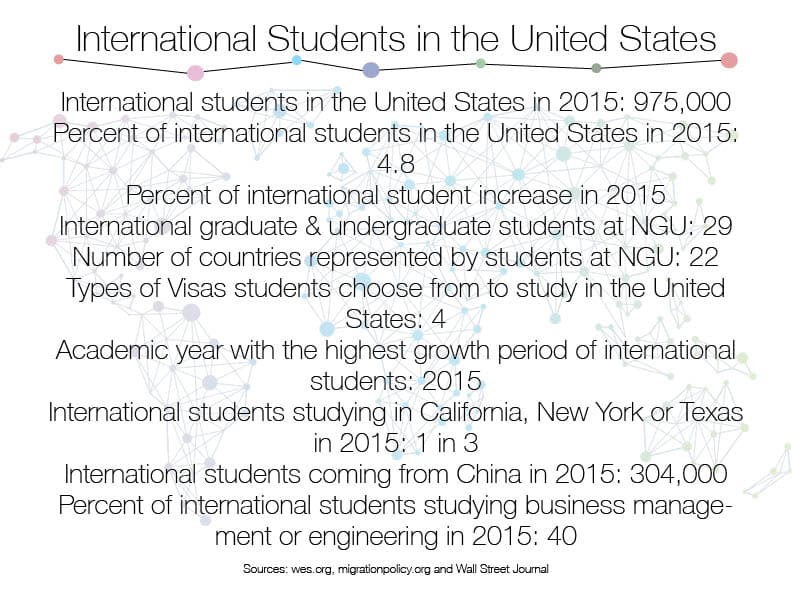
Life from the other side: International students at NGU
Photo courtesy Pixabay.com
Camille Hagerman, Contributing Writer
Fernanda Santos de Lucca’s college dorm looks like any other North Greenville University student’s dorm with wooden furniture, girly decorations and lacks anything out of the ordinary to show that she is an international student from Brazil, South America dealing with a completely different set of struggles than the average American student.
De Lucca, 20, is from Marília São Paulo, Brazil and has been studying Business and Marketing at NGU for the past two and a half years. De Lucca is one of an estimated 30 international undergraduate and graduate students currently enrolled at NGU, according to Leslie Brown, NGU reference librarian. These international students represent different countries from all over the world including Brazil, Egypt, France, Nigeria and Canada, as estimated in the records Brown keeps.
Coming from another country to study in the United States makes the already stressful life of the average college student even more complicated. One struggle De Lucca has faced is the culture shock of moving in to school two days before classes began in 2015 without having ever seen the campus in person and having never even been to the United States prior to attending NGU.
De Lucca states, “I was searching for pictures and I couldn’t come here to see it, but I thought the campus was really beautiful with a really nice environment. It’s tough for us international students to really get to know the place before we come here.”
De Lucca chose NGU because the school’s beliefs align with what her family believes, and she hoped to make her parents feel comfortable that she would attend school outside of her home country. The size of the university was also attractive to her because De Lucca believed that at a bigger school, she might not be able to make friends as quickly or as easily as she did at NGU, which is another struggle for international students, and especially for those dealing with a language barrier.
One such student is Flor de Liz de León, 18, an international student from Panajachel Sololá, Guatemala whose first language is Spanish. She is a freshman biology major with aspirations to become a surgeon and she moved to the United States a week before classes started in August 2017.
Although De León had been studying English consistently for many years before ever coming to the United States, she still struggles with classes and the language barrier when studying and learning.
De León says, “I think like it’s kind of hard for me to accept that I’m not as good as everyone else… because English is my second language and not my first language. And I wasn’t used to that. Everything that I achieve is with more effort than others.” De León says there are times when she is in class that she struggles to keep up with the lecture, or the homework after, because the of the language barrier.
Not only do internationals struggle with the language barrier, they may also struggle with learning a new culture, making friends and feeling accepted. De Lucca states, “Because you are foreign, sometimes your opinion doesn’t have the same value.” De Lucca says that some Americans can be self-centered and, at times, she feels that her opinions are not valued on the basis that she does not grasp the culture. She says there are times she gets dismissed or ignored instead of appreciated as an individual.
On the other hand, being an international student is not all negative struggles and hard situations. Some positives De Lucca sees to studying in the United States are the academic and extracurricular opportunities available to students. She says, “One thing that I do really appreciate in the American culture, is this incentive to be [involved] in sports and the arts. In Brazil it’s not like that. If you want to be involved in a sport [in Brazil], you have to go out and do it on your own.”
De Lucca explains that in Brazil, to be involved in sports there are no scholarships and a person must enroll in an academy or something separate outside of school. For example, if De Lucca wished to play tennis in Brazil, she would have to find somewhere that would allow her to still be involved in school or work and would also allow a woman to play, since that is generally discouraged. The fact that in the United States it is available and encouraged is something that De Lucca appreciates.
De León agrees saying that being able to experience multiple cultures is enriching. She says learning from different countries is a unique experience that a person can grow from, even through the difficulty of learning a new language and culture.
Dion Harmen Nijboer, 21, is a graduating senior from the Netherlands who spent two years playing tennis at NGU and two years at Francis Marion University. He says, “It’s nice that education is easier here than it is in the Netherlands…. There are more requirements in Europe and not everyone is able to go to a university.”
Nijboer says that not everyone in Europe pursues a higher education because it is tougher to be accepted in an institution or university. He explains that there are more requirements and levels to being accepted, but in the United States it is much more accessible. Nijboer also said that classes are easier to take here than in Europe.
When asked what she wishes Americans understood about the struggles of being an international, De León says, “I know what I am doing, and I came to a country that is not mine. It’s a different language and sometimes it’s a competition. But just because I’m not as good as everyone doesn’t mean I want people to have pity on me.” De León states that when dealing with competitive situations, such as scholarship competitions or job interviews, she is at a disadvantage to native speakers from the United States. However, she does not want anyone to give her the job or the scholarship just because she is foreign. De León says she wants to work hard until she is as good as everyone around her.
Language barriers and cultural differences are hard to navigate. Nijboer says, “It’s kind of hard to adapt and find your way. Be nice and kind to [internationals]. Here it was good, at NGU everyone was kind to me.”


